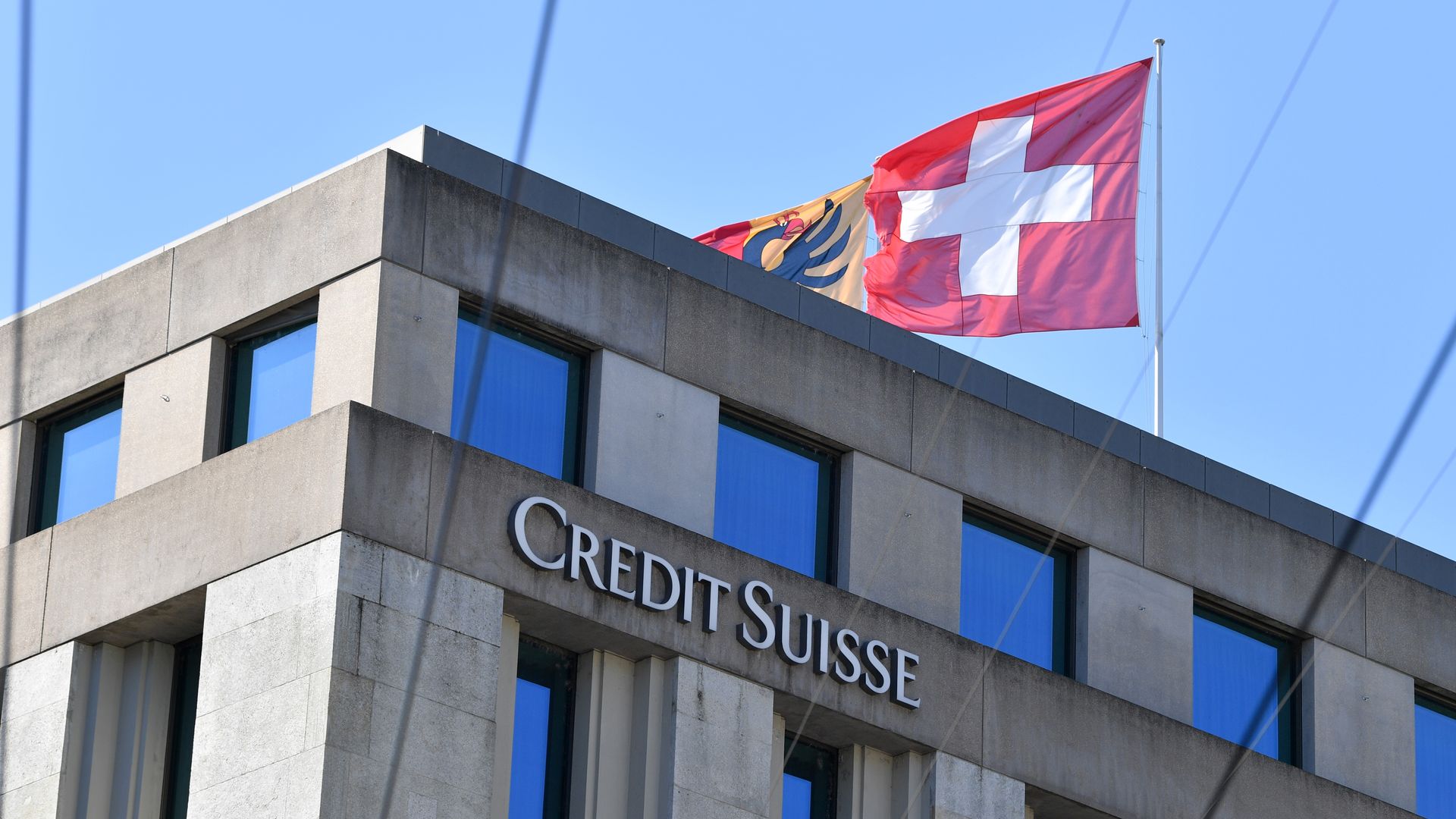A Swiss bank held nearly 100 Nazi-linked accounts, senators reveal
Photo: Lian Yi/Xinhua via Getty Images
For decades, the scale of the relationship between a major global bank and the former German Nazi regime has remained unclear, with investigations lacking the necessary funding and resources.
Yes, but: Two confidential reports released Tuesday shed new light on the connections between the Nazis and Credit Suisse, revealing that the bank held nearly 100 accounts linked to German Nazis and members of Nazi-linked groups in Argentina — in some cases, until recent years.
- The bank didn't close an account belonging to a former Nazi commander sentenced during the Nuremberg trials until 2002, the reports found.
- It wasn't the only account the bank maintained into the 21st century: In another case, the bank held an account for a Nazi-linked official in Argentina until 2020.
Why it matters: Jewish advocates have long argued that the Zurich-based bank played a larger role in supporting the Third Reich and its top officials than was previously known — and that the bank could still hold money the Nazis looted from Jewish victims during the Second World War.
- Today, Credit Suisse ranks among the 50 biggest banks in the world, and the historic revelations are likely to intensify pressure on the institution to further investigate its role in supporting Nazis both during and after the war.
Driving the news: The Senate Budget Committee released the two reports on Tuesday — Holocaust Remembrance Day — as part of an investigation into Credit Suisse's own efforts to probe the Nazi-linked accounts.
- "Credit Suisse appears to have maintained accounts, the vast majority of which have not previously been disclosed, for at least 99 individuals who were either senior Nazi officials in Germany or members of Nazi-affiliated groups in Argentina," the committee said in a press release.
- "Seventy Argentine accounts with plausible links to Argentina-based Nazis were opened with Credit Suisse after 1945, and at least 14 of those accounts remained open into the 21st century—some even as recently as 2020."
Background: In 2020, the Simon Wiesenthal Center, a Jewish human rights group, revealed that an Argentinian investigator had discovered a war-era list of 12,000 Nazis in the country.
- The unearthed records, the SWC said, showed that many of those people "had contributed to one or more bank accounts at the Schweizerische Kreditanstalt," Credit Suisse's predecessor.
- Argentina's pro-Nazi rulers both in the early days of the war and the years after made the South American country a popular destination for Germans fleeing justice.
What they did: Credit Suisse hired a forensic research firm to investigate the claims, and retained veteran attorney Neil Barofsky to oversee the review, the senators said in a press release.
- But things took a turn earlier this year, when Iowa Sen. Chuck Grassley, the top Republican on the committee, "received credible allegations of potential wrongdoing related to Credit Suisse’s internal investigation, including specifically the questionable removal of Mr. Barofsky in late 2022."
- That's when Grassley and Sen. Sheldon Whitehouse (D-R.I.), the committee chair, started taking a closer look. With both parties on board, the committee issued its first subpoena in more than 30 years to obtain Barofsky's unreleased report.
- During the course of its investigation, the committee also received the report from AlixPartners, the research firm tasked with the initial review.
What they're saying: "[T]he information we’ve obtained shows the bank established an unnecessarily rigid and narrow scope, and refused to follow new leads uncovered during the course of the review," Grassley said in a statement.
- The SWC said in a statement that the committee's work "shines light on a dark and troubling past that has remained outside the historical record."
The other side: Credit Suisse downplayed the findings, saying that the AlixPartners probe showed that the SWC's claim that "many" names on the Argentinian list held accounts at the bank didn't hold up.
- In a lengthy statement Tuesday, the bank said that it views the dozens of post-war Argentinian accounts "as not relevant to the context of the issues raised by the SWC."
- It added, "The investigation also found no evidence that eight long closed accounts identified in this period contained assets from any Holocaust victims."
- The bank did, however, acknowledge that AlixPartners had identified one new war-era Nazi account from a separate list of high-ranking Nazis provided by SWC, as well as 12 post-war accounts.
What's next: Credit Suisse has agreed to expand the scope of its review, the senators said, and AlixPartners will perform "a supplementary review" to address some of the still-unanswered questions — such as the value of assets in some of the post-war Nazi accounts.
- The bank has "committed to further investigate its apparent role in supporting Nazis fleeing from justice after WWII," the senators said.
- "The Committee intends to continue its oversight of this matter," they added.
Go deeper: UBS agrees to buy Credit Suisse for $3.2 billion
Source: Read Full Article



